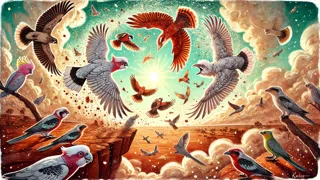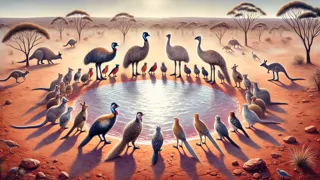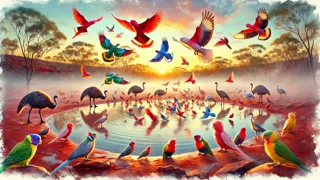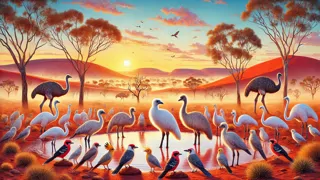Introduction
Beneath the ochre-stained skies of ancient Australia, a hush settled over the red earth as birds from every corner of the desert convened at the edge of a shimmering waterhole. Emus paced cautiously through spinifex grass, cockatoos fluttered onto gnarled ghost gums, and silent-winged owls perched in shadowed hollows. Even the parakeets and swallows, tiny and wide-eyed, gathered in a riot of anticipation, for word had spread that the Great Spirit would soon decide who among them would receive the gift of color. Dust motes danced in the golden morning light, and a gentle breeze carried the scent of eucalyptus and warm sand. Each bird hoped to claim brilliant hues—ruby reds, sapphire blues, emerald greens—to adorn their feathers forever. Yet beneath the hopeful chatter lay a simmering tension: rivalries old and new, questions of pride, and a fear that some creatures might seize the Spirit’s favor by force. Above it all, the kookaburra perched on a high branch, its knowing eyes reflecting both mischief and wisdom. It laughed a single, echoing call that rippled through the assembly, promising guidance to those willing to listen. And so, as dawn’s first rays crept across the horizon, the contest began—and with it, the stirring of a story that would color the bush for all time.
The Great Council of Feathers
The council convened at the water’s edge, each bird stepping forward with a unique plea. The emu spoke first, its deep voice a rolling echo across the stones: it desired strength to carry its people’s stories across the plains. The white cockatoo flared its crest, asking for brilliance—to shine like the sun so others might follow its flight. A restless magpie called for melody that would echo through the night, warding off darkness with song. Even the shy nightjar crept from shadow to request subtle shimmer, so it might slip unseen through the world. Around them, kangaroos paused to watch, and wallabies leaned in, intrigued by the spectacle. Overhead, a pair of budgerigars twittered eagerly, each dreaming of green and yellow feathers to mirror the spinifex grasses below. As each plea was heard, the Spirit’s voice drifted on the wind: “To deserving wings I grant my gift.” But as the list grew, so did murmurs of envy. The ibis, tall and solemn, felt slighted when its prayer was passed over; the tiny finches fluttered anxiously, fearing they had spoken too softly. A hush fell, broken only by the kookaburra’s laughter—light but insistent—a reminder that patience and respect might temper proud hearts. Yet while some found solace in humility, others bristled with ambition. Feathers ruffled, eyes flashed, and soon the gathering teetered on the brink of discord.

The Clash of Wings
When the ibis protested loudly, convinced its long slender beak and regal stance deserved vibrant white to match its elegance, the parrot screeched in protest, insisting its mimicry and colorless form required the gift more. Heated words gave way to flaring wings and raucous squawks as the sky above the council turned into a whirlwind of feathers. Cockatoos charged at magpies, glossy black ravens dove at rainbow lorikeets, and even the smallest finches joined the fray, their chirps lost amid the chaos. Dust roiled, blinding some, while feathers drifted like red snow through the heat. In the center, the kookaburra raised its head and laughed, the sound slicing through turmoil with startling clarity. Slowly, heads turned. In that sudden silence, the Spirit’s presence could be felt in the hush: a gentle rustling as if leaves themselves had drawn breath. Then a single beam of light burst from the sky, illuminating the waterhole and casting every bird’s shadow across its surface. The fighting ceased at once. Wings dropped. Engines of pride stalled. Under that celestial glow, each creature saw itself mirrored—proud and flawed, fierce but vulnerable. And for the first time, the flock listened to one another’s hopes instead of their own demands—all because laughter and reflection had ended the storm.

The Dawn of Color
As peace settled over the plains, the Spirit spoke again: “You have shown fire and fury, but also the power of unity. Now, share and receive as equals.” At once, the waterhole gleamed with prismatic light. Emus felt their feathers seep with rich chestnut brown, warm and earthy. Cockatoos brimmed with ivory white and blush-pink hues that glowed against ghost gums. Magpies gleamed with obsidian and snow, while lorikeets shimmered in ruby reds, emerald greens, and sapphire blues that mirrored the wildflowers. Even the humble finch sprouted buttery yellow and soft cinnamon brown. In that sacred moment, every bird discovered that true color came not from might or demand, but from understanding and shared spirit. The desert breeze carried their joyful calls far across the red earth, sealing the gift for generations. When the new dawn broke, Australia’s sky became their canvas, and each bird a living stroke of brilliance. And though the winds might shift and seasons change, the lesson would endure: that harmony, not conflict, births the brightest hues.

Conclusion
Long after the contest and its trials, the story of how the birds earned their plumage spread from one end of the land to the other. Elders told it by campfires under starlit heavens; parents recounted it to dreaming children beside the crackle of ghost gum logs; painters painted the rainbow wings against ochre cliffs. Every feather became a reminder of pride tempered by respect, ambition softened by listening, and rivalry transformed into shared joy. To this day, when the kookaburra’s laugh echoes through the gum trees, it carries the ancient wisdom: that beauty shines brightest when we honor each other’s stories and walk together in harmony. And so the world remains vibrant, bird by bird, color by color, woven by a timeless truth born on the red earth of Australia.


















